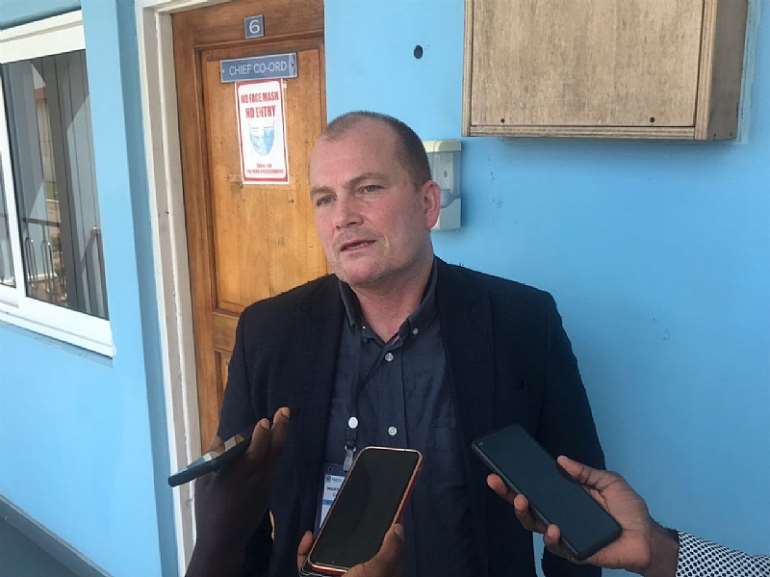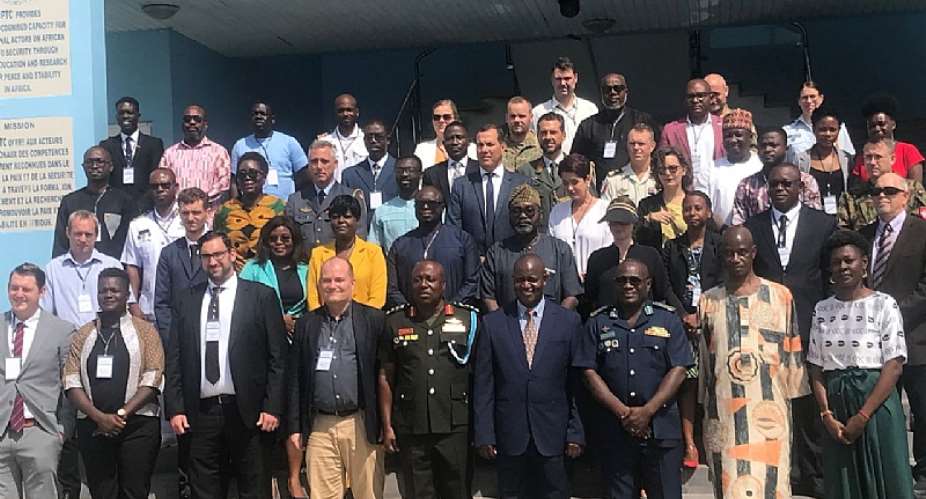The Kofi Annan International Peacekeeping Training Centre (KAIPTC) is hosting a 2-day Maritime Security Conference from Wednesday, November 16, to Thursday, November 17.
The conference is organized by KAIPTC, the Royal Danish Defence College (Forsvarsakademiet) and the Research Institute of the University of Stellenbosch supported by the Danish Peace and Stabilisation Fund.
Delivering the opening remarks to open the two-day conference, new KAPITC Commandant, Major General Richard Addo Gyane indicated that he is excited his outfit is hosting such an important conference which provides an excellent opportunity to take stock of past efforts, experiences and lessons learnt within the maritime security space in the Gulf of Guinea (GoG) with the hope of applying these lessons to future endeavors.
Raising concern on the threats in the Gulf of Guinea including activities of pirates as well as Illegal, Unreported and Unregulated fishing (IUU), he said there is a need for a collaborative effort from all GoG states to find the right solutions to deal with the issues.
“The pervasiveness of maritime security threats across the region, therefore, illustrates the need for a holistic approach to maritime security response in the region.
“Sustainable development of the blue economy, improvement of the well-being of coastal communities and commitment and collaboration across agencies and governments, therefore, becomes key in reducing maritime insecurity in the Gulf of Guinea,” Maj Gen R.A Gyane stressed.
In his concluding remarks, the Commandant of KAIPTC expressed appreciation to Professor Kwesi Aning, of the KAIPTC, Prof. Vrey of the Stellenbosch University and Prof. Mandrup of the RDDC, and everyone involved in putting together the 2-day Maritime Security Conference.
Delivering the keynote address under the theme "Maritime Security in The Gulf of Guinea: Re-thinking the Past and Contemplating the Future", Associate Professor at Royal Danish Defence College, Prof. Thomas Mandrup warned that Maritime insecurities do not only damage institutions in the maritime domain but can and will damage development initiatives on land as well.

He shared that the vicious cycle of maritime insecurity is a central concept in the literature on maritime security since it describes how structural weaknesses like weak governance and limited trickling down of economic benefits to local communities from large-scale natural resource extraction projects combined with environmental degradation.
According to him, these elements are amplified and exacerbated by piracy, kidnapping and ransom at sea, migration, smuggling, etc.
He stressed that to effectively deal with the individual elements in this vicious circle, bad governance including weak institutions needs to be addressed and genuine regional cooperation implemented.
In proffering solutions to address the Maritime insecurities in the Gulf of Guinea, Prof. Thomas Mandrup noted that given the ever-rising importance of the oceans as geopolitical and geoeconomic landscapes, it is now imperative that coastal and island state governments in the GoG continue to design and align policy, strategy, and ocean programmes to improve the security underpinnings of their maritime interests.
“If the states in GoG work together more smartly, embarking on innovative maritime diplomacy initiatives with naval and other maritime assets, and building healthy maritime sectors, West and Central African states create spaces to benefit from the advantages embedded in the GoG as a flow and stock resource,” Prof. Thomas Mandrup who is also an Extraordinary Associate Professor at Stellenbosch University in South Africa stressed.
 Prof. Thomas Mandrup
Prof. Thomas Mandrup
He added that the most important thing is for the Gulf of Guinea states to show political will and improve governance.
He cautioned that without these, it will be difficult to realise the ocean's potential while the insecurities remain.
Sharing some remarks, Prof. MS Tshehla, Professor of Mathematics, at the Faculty of Military Science, Saldanha Campus of the University of Stellenbosch emphasised that the 2-day Martine Security Conference is of great importance.
In his short speech, he added to calls for countries to collaborate to maintain order in the Gulf of Guinea for the unborn generation to also benefit in the future.
“Nations must try their best to keep good order at sea. For generations to come we will resort to the sea for bread and butter. As countries we need to ensure we keep order at sea for our benefit,” Prof. MS Tshehla said.
He concluded, “I wish all presenters the best of luck. We look forward to more collaboration with KAIPTC in the future.”
The aim of the 2-day Maritime Security conference is to gather international academics, practitioners, and policymakers from the Ghana Maritime Authority, Obafemi Awolowo University, University of Copenhagen, University of South Africa, Nigerian Maritime Administration and Safety Agency (NIMASA) and other relevant institutions to share ideas, experiences, and goodwill to map the nature of the challenges obstructing the ambition of good order at sea in the Gulf of Guinea (GoG).
In tandem with the conference contributions, the organizers envisage mapping out a policy paper on pointers for forward-looking maritime security governance in the GoG.






 Akufo-Addo’s govt is the ‘biggest political scam’ in Ghana’s history – Mahama ja...
Akufo-Addo’s govt is the ‘biggest political scam’ in Ghana’s history – Mahama ja...
 Performance Tracker is not evidence-based — Mahama
Performance Tracker is not evidence-based — Mahama
 Four arrested for allegedly stealing EC laptops caged
Four arrested for allegedly stealing EC laptops caged
 $360 million IMF bailout not enough for Ghana – UGBS Professor
$360 million IMF bailout not enough for Ghana – UGBS Professor
 Shrinking Penis Allegations: Victim referred to trauma hospital due to severity ...
Shrinking Penis Allegations: Victim referred to trauma hospital due to severity ...
 Adu Boahen Murder: Case adjourned to May 9
Adu Boahen Murder: Case adjourned to May 9
 ‘I've health issues so I want to leave quietly and endure my pain’ — Joe Wise ex...
‘I've health issues so I want to leave quietly and endure my pain’ — Joe Wise ex...
 Let’s help seek second independence for Ghana before NPP sells the country – Law...
Let’s help seek second independence for Ghana before NPP sells the country – Law...
 New Force aims to redeem Ghana and West Africa — Nana Kwame Bediako
New Force aims to redeem Ghana and West Africa — Nana Kwame Bediako
 ‘I didn't say I would buy Ghana if voted against; I said I’ll buy it back from f...
‘I didn't say I would buy Ghana if voted against; I said I’ll buy it back from f...
